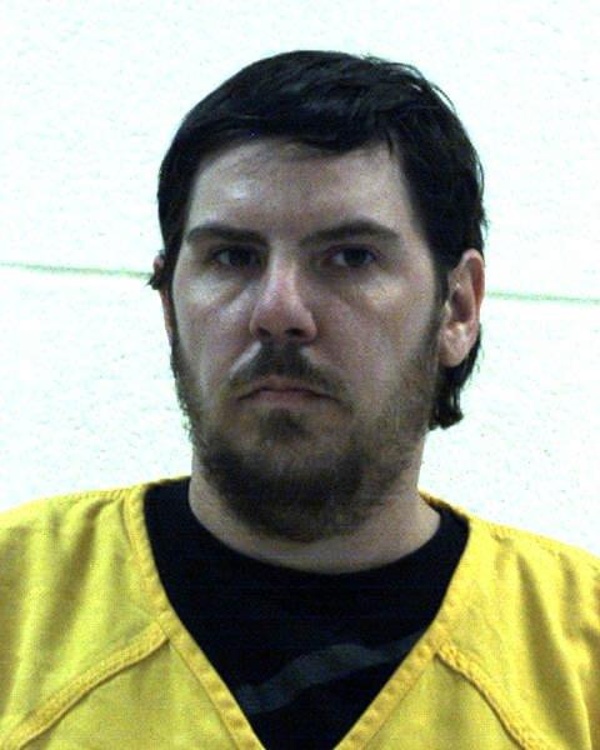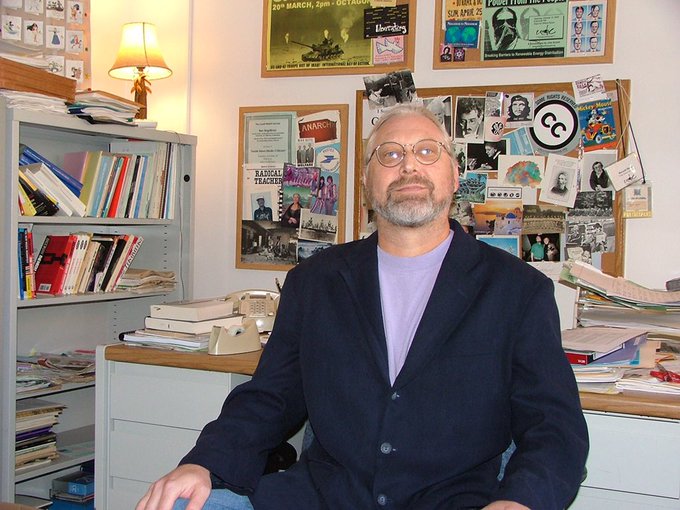
George Ishler mugshot.
A man and woman are accused of murdering a Penn State communications professor by pushing him off an 80-foot quarry ledge.
George Ishler and Danelle Geier, 32, are charged in the murder of media studies Professor Ron Bettig. Ishler, 39, is the older uncle of Geier, who was dating Bettig.
Bettig was missing for a week before his body was found Aug. 19 in a quarry pit near Potter Township in Pennsylvania.
A criminal complaint says the pair conspired to murder the 56-year-old professor.
Here’s what you need to know:
1. Prosecutors Allege that Ishler Pushed Bettig Off the Ledge
According to WJACTV, “George Ishler drove Bettig to the quarry under a ruse.”
The TV station said that, once they arrived at the quarry, “police said Ishler pushed Bettig off an 80 foot ledge, causing his death.” They had walked up to a “high wall” in the quarry, says the criminal complaint.
Police say the pair originally planned to drown the professor at a Delaware beach, WGAL says.
Read the criminal complaint here.
2. Geier Lured Bettig to The Quarry With a Story About Drugs & He Was Romantically Involved With Geier, Reports Say
Geier, who was living with Bettig, told him she was growing marijuana plants in the quarry pit to entice him to go there, said WJAC.
Geier’s sister, Angela Hill, told Wearecentralpa.com that she doesn’t believe Geier intended to be part of a murder.
Bettig and Geier “shared a special love story,” the news site quoting Hill as saying, adding that Hill said that “at one point Geier and her baby were homeless” and Bettig took them in “and gave them a place to stay.” He was planning to propose, she told the news site.
3. The Couple Thought They Might Benefit From Bettig’s Will, Authorities Allege
Ishler and Geier were friends with Bettig, and Ishler allegedly told police “that they could benefit financially from Bettig’s death, because the professor had recently signed a last will.”
Ishler and Geier were known drug users, police said, according to WGAL.
WGAL said police say “Ishler stated that he did not like the way Bettig treated Geier” while they were at a Delaware beach shortly before the murder, saying “Bettig was ‘ignorant’ to Geier and was upset about how she was raising her child.”
4. Ishler Staged The Scene After Pushing The Professor Off the Quarry Ledge & Geier Was Upset With Bettig, Police Say

A photo of Bettig that a former student posted on Facebook.
Geier allegedly texted Ishler, “So ready I am pissed off,” and told police that she was referring to “being ready to kill Bettig,” said Bradenton.com, adding that Bettig upset “Geier when he critiqued how she was raising her son,” authorities said.
Court records say that Ishler told police he heard a “crunch” when Bettig landed at the bottom of the quarry and then left the scene.
He later returned to stage the scene with items including water bottles, a flashlight, a small hand rake and a bag that he took from Bettig’s residence, an affidavit said, according to the Centre Daily Times.
NBC 10 Philadelphia says “Geier told police that she and Ishler also agreed to stage the scene with items such as Bettig’s car to make it appear as if he was alone, and they agreed to report him missing three days later.” The TV station says the pair reported that Bettig was missing to police on Aug. 15 and said he might have gone to California, authorities allege.
5. Bettig Was a Long-Time Communications Professor Who Received a Teaching Excellence Award

Professor Ron Bettig’s photo on the Penn State page.
Ronald Bettig’s page on the Penn State Website says he joined the College of Communications at the university in 1988. “He teaches undergraduate and graduate courses on the political economy of communications,” the website said.
He authored the book, “Copyrighting Culture: The Political Economy of Intellectual Property” (1996, Westview Press) and co-author, with Jeanne Lynn Hall, of “Big Media, Big Money: Cultural Texts and Political Economics” (2002, Roman & Littlefield). “He also has published a number of book chapters and journal articles and presented many conference papers on political economy, intellectual property, and media industries,” says the Penn State website.
The site adds that Bettig was “a longtime member of the Union for Democratic Communications and has served as a member of the organization’s steering committee since 1993. He won the Excellence in Teaching Award from the College of Communications Alumni Society in 1996 and has been named Faculty Marshal five times. He also has chaired and served on dozens of scholar, master’s and doctoral thesis committees.”
The Union for Democratic Communications wrote on Facebook of Bettig’s death, “Ron was an excellent teacher and scholar who had lasting impact on his students. I know many of us at UDC were influenced in some way by Ron’s work and mentorship. UDC as an organization was always so important to Ron for the intellectual and political work we do and for the friendships he treasured. He always loved calling us his ‘Com-rads.'”
The Penn State website says Bettig received his Ph.D. from the University of Illinois and his Bachelor’s degree from UC-San Diego.
